Though summer got its official start just a few days ago, recent weeks of soaring temperatures and humid conditions have already taken a toll on Springfield’s ever-growing unsheltered community, according to advocates and volunteers with The Connecting Grounds Church.
Pastor Christie Love and Justin Burnett, who is interning at the church’s Outreach Center, both said they are seeing people who show signs of heat exhaustion and dehydration.
“I had a gentleman who had holes in the soles of his shoes,” Love said, “and he had walked from being discharged from the hospital all the way to the downtown area looking for services that evening. And the skin on his feet had literally blistered and peeled off because of the heat of the concrete.
“I’m incredibly concerned that we could have loss of life this summer simply because of the impact of the heat,” she said. “There’s not enough water. There’s not enough food. There’s not enough shelter.”
Every afternoon when temps get into the mid-90s or hotter, The Connecting Grounds’ street outreach team goes out in pairs to help the unsheltered.
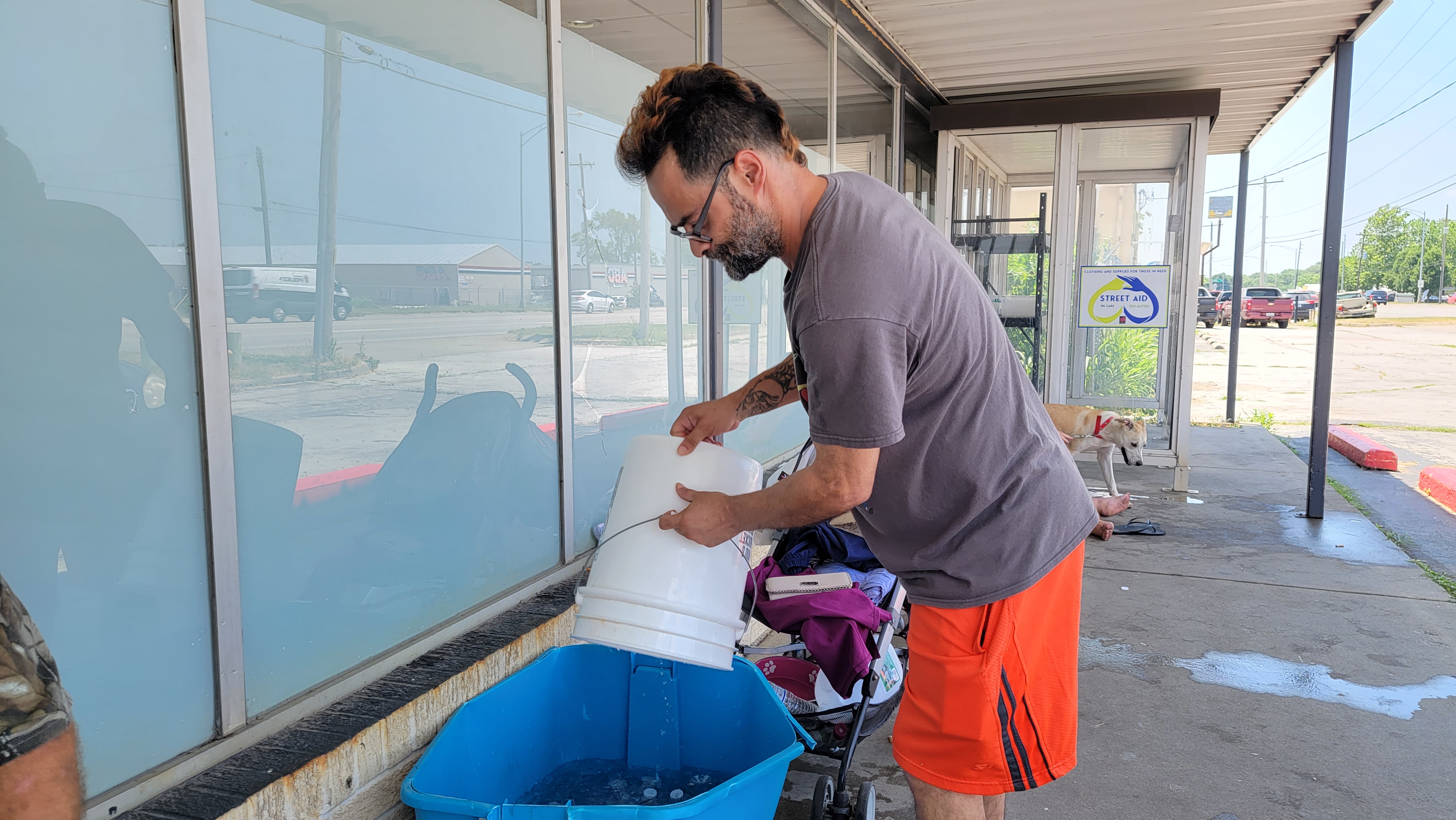
In coolers, the team carries bottles of cold water, small Ziploc bags filled with ice and popsicles. They also bring cooling towels (when they have some), snack packs of ready-made food, sunscreen and other supplies to help people without shelter survive the heat.
Volunteers and staff with The Connecting Grounds Church are continually collecting data on and surveying folks who come to the Outreach Center for services and those they encounter on the streets and in camps about their circumstances.
Love said she’s noticed a couple of disturbing trends in recent weeks: there’s a sharp increase in people who are newly homeless, there’s an increase of families with children (many of whom are living in vehicles), and the number of people in their 50s, 60s and 70s is quickly increasing.
“The numbers are higher. Desperation is greater. It’s more urgent,” Love said. “There’s a lot more fear than we’ve seen in past summers, because there’s a lot more people that are new to being out here.
According to Love, they are seeing about 60 to 70 new people every two weeks when they update the street census numbers.
“So there’s a lot of, ‘I don’t know where to go. I don’t know what to do,’” Love said. “Demand is higher and resources are lower. This is not a great combination. And it’s not just us. I mean, resources are lower across the spectrum of nonprofits and service agencies.”
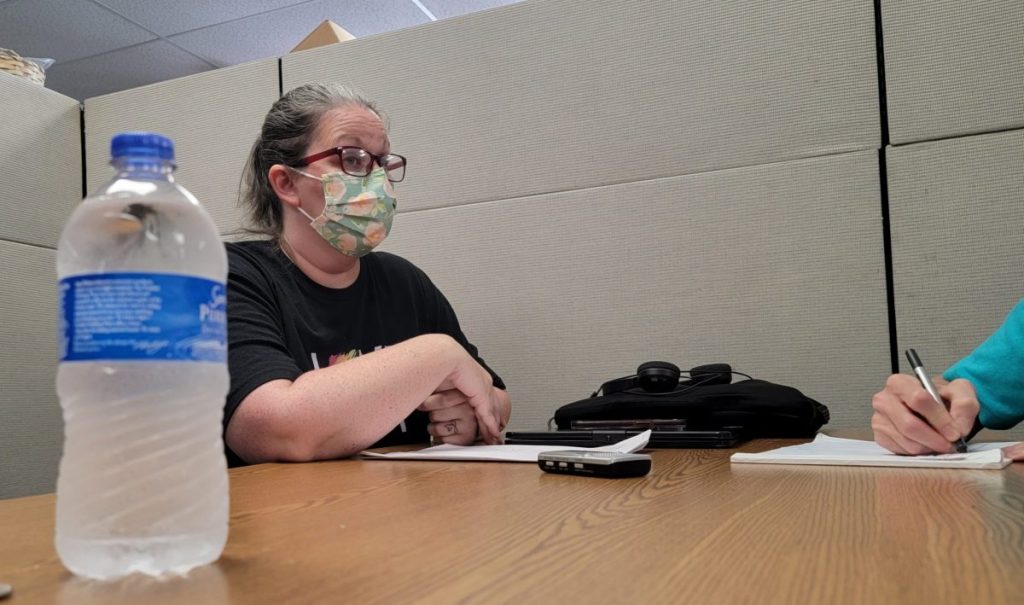
Regarding that uptick in the number of families with children, Love said they are finding many of these families had been doubled-up with other relatives. But for whatever reason — be it the rising cost of groceries or rent or a disagreement — that living situation was no longer sustainable.
“We’re seeing an increase in the number of kids that are living in cars with their parents,” she said. “We’re seeing an increased number of kids that are in tents.”
Because of the Connecting Grounds’ Family Connection program, Love and her staff are in constant communication with Children’s Division staff about these situations involving families with kids.
“But we’re also out of foster homes,” Love said. “Children’s Division is juggling this rapidly increasing need and there’s nowhere to put kids.”
And with the increase of unsheltered older people, there’s an increase in medical risks associated with life on the streets.
“Our medical clinic is literally busy from the second we open the door to the second we close the door,” Love said. “It’s everything from urgent wounds to hospital referrals to high blood pressure. We had a woman in here the other day (with) skyrocketing blood pressure. It was like 290 over 180. She was overheating.”
People who are living in their vehicles are struggling more than ever to pay for gas to keep their car going. Plus, being in a hot parked vehicle this time of year is more dangerous than being in a tent, Love pointed out.
In the past, people could sometimes earn $20 or $25 gas cards by volunteering a few hours at the Outreach Center. But this time, there are no gas cards to give out.
Burnett said he gets a lot of requests for bus passes and that folks were thrilled with City Utilities free-ride day on June 16.
“Everybody was so grateful and excited,” Love said. “Then the next day, if you wore a red shirt you could ride the buses for free. So we were digging out every red shirt we could find in the back, trying to make sure people had red shirts.”
Other “code red” items the Outreach Center desperately needs right now include tampons, ready-to-eat food items, Gatorade and cooling towels, Love said. (Find an Amazon wishlist here.)
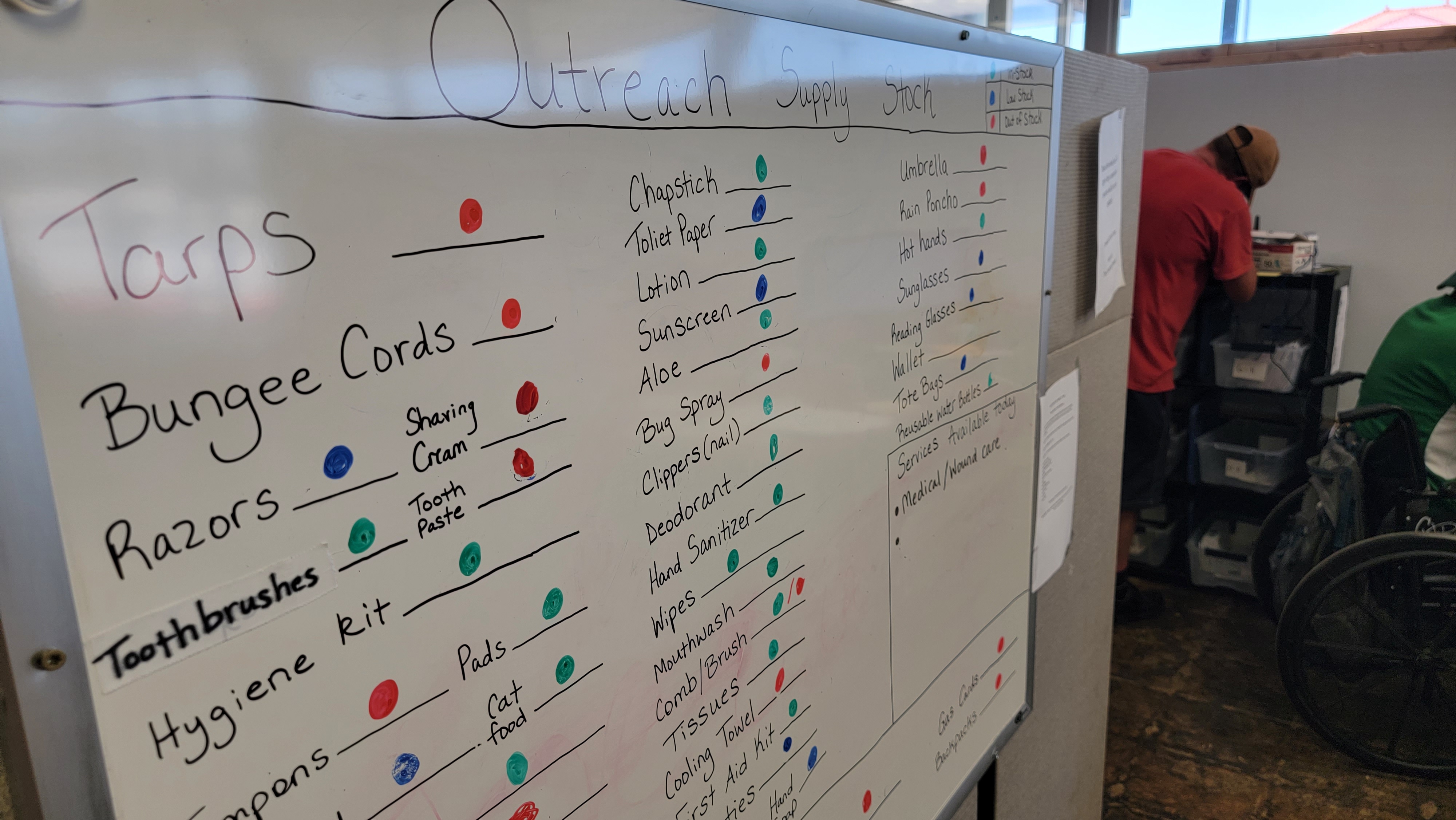
Water refill program will cut down on one-time-use plastic bottles
Water is a critical need for safety and human survival — especially during the hot summer months. But for the unsheltered community, that water is usually delivered in a one-time-use plastic bottle.
“We also juggle the environmental impacts of summer outreach with that many plastic water bottles, the one-time-use water bottles that go out,” Love said. “We know that it’s clogging up landfills. We know that it’s clogging up our streets and our waterways.”
To address this issue, The Connecting Grounds is implementing a water refill station program this summer.
“We are currently working on giving out reusable water bottles here at the Outreach Center,” Love explained. “But then to go along with that, we have to create a network of safe, secure water sources for people to use.”
The water sources will mostly be outside — like spigots or a locked water cooler that people could use to refill their reusable water bottle.
Love and Burnett are in talks with several churches and faith communities, as well as businesses and organizations that might be willing to participate.
“We’re getting ready to install an outdoor water spigot,” Love said. “We’ll just have a refill station on the side of the (Outreach Center) that’s accessible 24/7.
“Some churches, I think, are probably going to follow that similar model,” she said. “Others, we’ve talked about taking water coolers, filling those with ice and water.”
To protect the integrity of the water and protect those who drink it, those coolers will need to be locked, Love said.
If your church or organization is interested in perhaps becoming a water refill station location, learn more by visiting theconnectinggrounds.com/water-refill-stations.
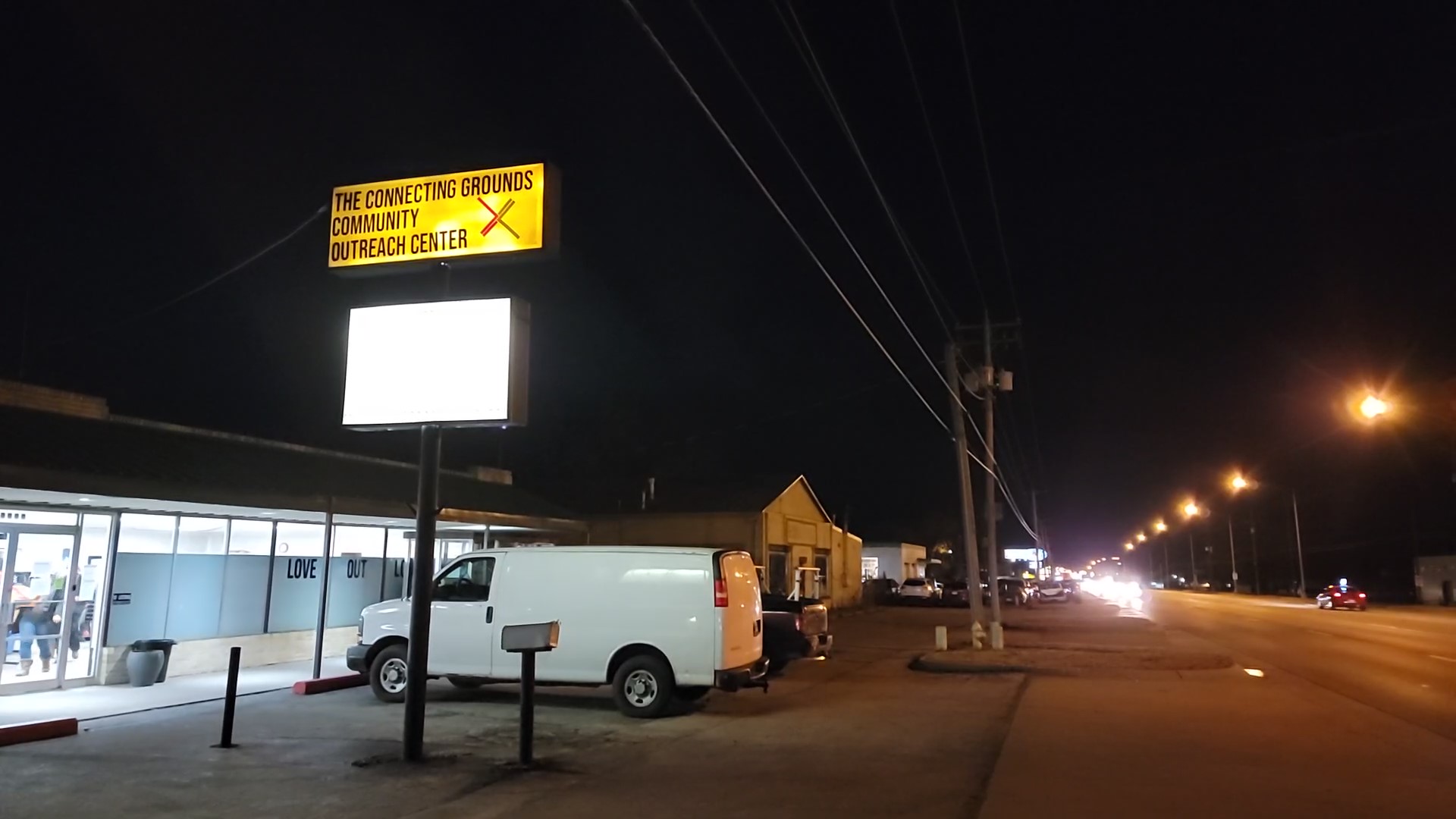
Woman, new to being homeless, shares her story
Jamie, a woman who was at the Connecting Grounds Outreach Center on Tuesday, is among those people who recently became homeless for the first time.
She is fleeing a domestic violence situation in a nearby county and asked that her last name not be used or photo taken.
Jamie has multiple serious health issues including Multiple Sclerosis, congestive heart failure, kidney and liver disease and stomach issues that require her to use a colostomy bag.
Jamie said she is relatively new to Springfield and had no idea where to go for help. She heard about the Connecting Grounds Outreach Center and called and called but the center wasn’t open. On Saturday, she and a friend walked five miles to get to the center and sat outside until it opened.
Five miles might not sound like much to some people, Jamie said, but it was difficult for her because she often falls due to her MS. Plus, it was well into the mid-90s on Saturday.
“It was like a trial and tribulation just to get here. But once we got here, I wasn’t leaving,” she said, smiling and nodding to Pastor Love. “This woman is great, her husband, her daughter, like everybody that we’ve met.
“You didn’t make me feel like an outcast or whatever, which just makes me feel good,” Jamie said to Love. “I love you for that.”
Because Jamie is at such high risk for infection and medical complications if she slept outside, Love got the funds together to put Jamie and her friend into a hotel room over the weekend.
Love also got Jamie an appointment at One Door, a community outreach program that provides housing and shelter intakes and referrals for homeless individuals in Springfield. And again — because Jamie has such an increased medical risk — One Door is able to continue hoteling for a time as they work to get her into a housing program.
Jamie came to the Outreach Center on Tuesday because Love made her an appointment at the MSU Care Clinic, a Mercy affiliate clinic that serves uninsured low-income adult patients.
Jamie shared her story with the Daily Citizen before catching the bus to her appointment.
She said she’d been with her abuser for 20 years. Everything was very normal until two years ago when he suffered a medical emergency that impacted his brain. After that, he became very violent towards her.
“I think he just lost his mind. I mean, he was my best friend. He never even called me a crossword for 17 years,” she said. “He wouldn’t go get help, and he just went from being a respectful, great, hard-working provider and papa, dad, to insane.
“I walked away from it all before he killed me,” she added.
Jamie said she once managed a shelter for survivors of domestic violence in another part of Missouri.
“I’ve never been on this side of it,” she said.
Jamie said she better understands now why it’s so hard to get out of an abusive relationship and that she had been pretty much a prisoner in her own home for two years.
But still, it was difficult to leave her home and all her belongings.
“We get used to those everyday things, blow dryers and all that stuff,” she said. “It’s hard.”
Before she found help at The Connecting Grounds, Jamie said someone suggested she seek shelter at a detox center. Jamie was really frustrated by that because she is not addicted to anything and felt she’d be taking a detox bed away from someone who really needs it.
“I’m not going to do that, go to detox for not detoxing,” she said. “I’m like, ‘I will die in a ditch alone before I go somewhere that is not pertaining to me at all. Why would I do that?”
“I’ve learned a lot in a couple days,” Jamie said, shaking her head.
“It’s not the kind of crash course education you wanted,” Love said to her.
“No,” Jamie said. “It kind of makes you realize what’s really important.”
Former councilman says homeless outreach is a ‘labor of love’
Burnett was elected to Springfield City Council in 2015 and resigned in 2016. For a time, he served as the director of Faith Voices of Southwest Missouri.
Burnett is interning this summer at the Outreach Center and with the Street Outreach Team as part of his bachelor’s degree program in Emergency Management at Drury University.
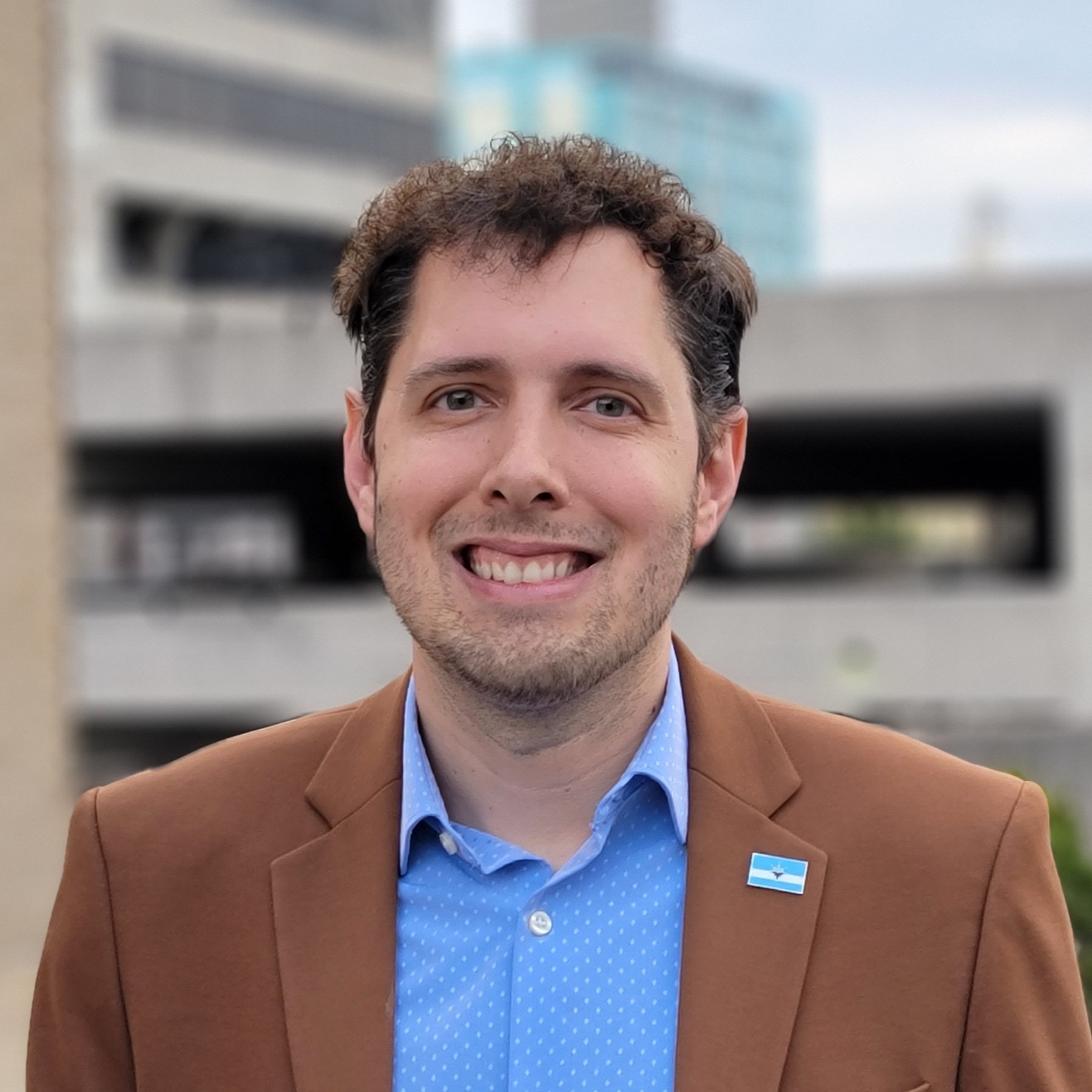
He explained how serving the unsheltered community fits well with his studies.
“One thing we study is the social vulnerability and disasters,” he said. “We look at the correlation between poverty and the effects of a disaster and the availability of resources in under-resourced communities.”
Burnett said they also spend a lot of time studying what happened during and after Hurricane Katrina in 2005 and the failure of the government’s response to that.
“A lot of that comes down to a lack of communication and collaboration between government and nonprofits — a lot of competition,” he said. “We have to realize we are all on the same team, that we have the same goal.”
Burnett said he’s surprised by the lack of affordable housing, transitional housing and emergency housing aid that’s available in the community.
“One woman, who I provided with crisis resources and a referral for rent assistance, was in distress due to being on the verge of homelessness,” he said later, via messenger. “She was very thankful for the help, but with community resources being limited, you always worry about the long-term outlook for those seeking relief.”
Asked why he wanted to do his internship at The Connecting Grounds, Burnett said participating in causes that “make life better for others” is among his core values and is “rooted in my understanding of what faith is.”
“While this is an unpaid internship, community service provides a degree of satisfaction that a paycheck cannot,” he said. “It really is a labor of love, which is a value that motivates every volunteer and staff member.”
Ways to help
- Click here to find The Connecting Grounds’ Amazon wishlist for summer outreach. You can order items and they will be delivered to the Outreach Center. One item that doesn’t appear to be on the Amazon wishlist but Pastor Love said is currently a “serious code red item” is tampons. Tampons (and other donations) can be dropped off at Cosmic Fish and Kaleidoscope during regular business hours. Donations can be dropped off at the Connecting Grounds Outreach Center 9 a.m. to 1 p.m. on Tuesdays, Thursdays, and Saturdays. (Larger donations should be directed to the Outreach Center rather than the two business partners.)
- If you regularly see people who appear to be homeless and/or struggling in the heat, Love suggested carrying instant ice packs (can be found in the first aid section of the store) and bus passes in your vehicle to give out. Once activated, the ice packs stay cold for hours and can be refrozen and reused.
- If you encounter someone who does not know where to get resources, find a pretty comprehensive list at springfieldmopoverty.com/resources.
- If you are interested in volunteering at the Connecting Grounds Outreach Center or with the street outreach teams, visit theconnectinggrounds.com/street-outreach.
- Learn more about The Connecting Grounds and find other ways to support its mission here.

